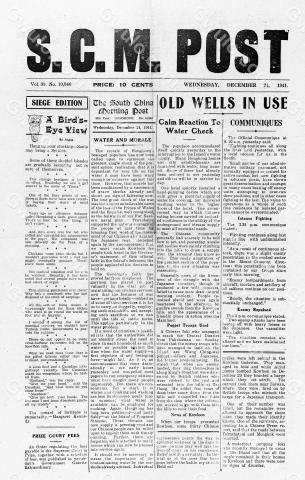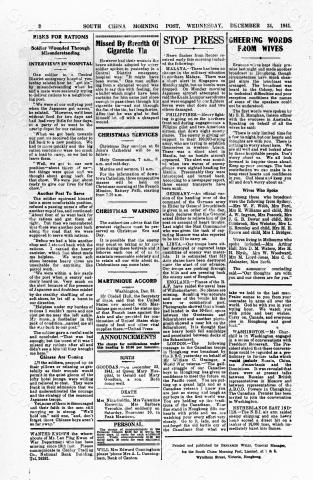The Middlesex are living up to their regimental nickname - the Die-hards - stubbornly holding up the Japanese advance to Victoria.
Down on the Stanley Peninsula the Canadians and members of the HKVDC spend the evening in a bitter firefight with the invading troops. Today and tomorrow parts of what will soon become the Stanley Internment Camp are engulfed in violence, something the internees will never quite forget.
Bill Hudson and his fellow Stanley Platoon (prison officers) were involved in some of this fighting. They were called up on December 19 and have had a relatively peaceful time until today:
Then the nightmare came at 8.50 p.m. on Christmas Eve. They attacked the Village ((Stanley Village)) with small tanks and thousands of troops, it was hell let loose, machine guns every, {sic} some of the Volunteers defended the left of the Village and the Mary Knoll, but the attack came direct for us from the Beach and the Lower Beach Road, for three and half hours we fought so, with lulls between, then they would come on again screaming their heads off, just to be mowed down....
Bill Hudson survives, and, like some of the other Prison Officers, is sent to Stanley in spite of being captured in uniform. {See tomorrow's entry.}
Conditions in town are deteriorating, as leading surgeon Li Shu-Fan testifies:
Towards the end of the eighteen days, most of the doctors had been in the city where the appalling health conditions frightened us. Malignant malaria, cholera, and other diseases were breaking out, and the hospital was getting its first quota of these. One had only to glance at the Hong Kong streets to see the reason for the epidemics. Stagnant pools of water, filthy tin cans, broken vessels and cesspools – all these, everywhere, were excellent breeding places for mosquitoes. The Sanitary Department had ceased to function and the coolies refused to work since the streets were unsafe during battle; so, too, anti-malarial squads stopped work and the scavenging coolies abandoned their rounds. Garbage and filth, accumulated in heaps everywhere, bred an unprecedented number of flies; and the thousands of decaying bodies scattered on the hillsides were additional breeding grounds….The swarms {of flies} brought on a wave of the four major bowel complaints – cholera, typhoid, dysentery, and diarrhoea.
Andrew Leiper and his fellow HKSBC Essential Workers open the Bank but very few customers appear. Leiper goes shopping:
Lane Crawford was one of the few shops still open, and I went there through an almost deserted street to buy some tins of food, toilet articles, a few odds and ends of clothing, and a small canvas bag to hold all that remained of my worldly belongings. The Portuguese assistant who served me said that he regretted he could not charge the purchase to my account as usual, and I would have to pay cash as all credit sales had been suspended.
George Kennedy-Skipton and Henry Refo go into work and then try to get back to the house they were forced to abandon on the night of December 22. They're after supplies for their large group:
Christmas Eve the men went back to work {at the Billetting Office}. After work Henry and Mr. Skipton decided to go back to Mt. Cameron in the big car. Planes sighting it and supposing it to be an officer's car dived and bombed it. Hearing the roar as the plane dived down, Henry and Mr. Skipton attempted to stop and get out. The first bomb landed some fifteen feet to the rear but struck the embankment above the car. Had it struck the road it would have been really serious. As it was, only one piece of shrapnel hit the car. It went through the rear window and embedded itself in the front seat a half inch from Henry's back. The plane returned and dropped one or two more small bombs that went wide of the car and of the men who by this time were far down the road. A little later they returned to the car, anxiously looked it over, got in, turned around and returned home as fast as they could.
Gwen Priestwood, who's been driving a truck delivering food all through the fighting, realises that the great and the small intertwine to create the experience of war:
I drove the gray truck all Christmas Eve and got home that night tired and dirty. There was a small package on the table. Wearily I opened it up.
Six pairs of sheer American silk stockings!
I almost cried. Well, I suppose any woman would have. Here I was, at a great moment of tragedy in the history of the British Empire, a city in flaming ruin around me, surrender to the Japanese a few hours away - and to me the silk stockings seemed the most beautiful things in the world.
The civilians captured at the Repulse Bay Hotel are given five minutes to pack. Mathilde ('Mimi') Compton has to leave her 'paralytic' husband Albert Henry ('Harry', the head of Sassoons since 1918) behind, and they are not to be re-united for months; some Chinese men are frantic at having to leave their wives and children in Japanese hands. The party is not told where they're going, but ordered to start marching. They're taken on a long, hard walk, up past the dead bodies in the Wong Nei Chong Gap:
Near the top of the peak Mr Needa I think it was, commandeered a passing truck being driven by a Jap soldier and managed to get it turned around in the direction we were going. Into it were loaded the mothers and children, the sick and the aged, a few of the bags. I suppose that some of our group would have died along the road without the help of this truck.
They continue downward through Happy Valley, close to No Man's Land. A short halt gives them hope they might be allowed to pass through to British lines:
But that hope died quickly; we were kicked into motion again, and descended the hillside to the Tai Koo light plant at the east end of Victoria City. From the weakest to the strongest, all of us were done in...
Just before dark they are taken into the filthy, looted Duro paint factory on the waterfront to spend the night.
But at the Hong Kong Hotel regulars are still allowed to sign chits for their bar drinks.
And back in Britain - well, hope springs eternal:
Hong Kong Hammered, Hits Back
Though facing new onslaughts from freshly-landed Jap troops, and having suffered 'very heavy casualties,' the weary defenders of Hong Kong are striking back at the enemy with tigerish ferocity.
The page 1 report goes on to suggest that the Japanese have fallen into a clever trap: they were allowed to march almost unopposed 'across the Tytam Reservoir dams' down to Stanley. The dams 'form a causeway' which was then blown up and the Japanese, cut-off from their bases, were subjected to withering fire.
Although it reports the death of two senior Canadian officers, the paper's also upbeat about the problems the Japanese will face in wresting the western half of the island from the defenders. And the back page continuation of the article stresses Hong Kong's strategic importance and quotes sources in London to the effect that if the Colony is captured there will be a counter-attack.
The Daily Express story on page one also claims success on the southern front with the 'town' of Stanley being retaken by the defenders.
Sources:
Bill Hudson: http://blunderingblindlybackwards.blogspot.co.uk/2011/08/amanuensis-monday-letter-from-bill_22.html
Conditions in town: Li Shu-Fan, Hong Kong Surgeon, 1964, 103-104.
Leiper: G. A. Leiper, A Yen For My Thoughts, 1982, 86
Kennedy-Skipton and Refo: Sally Refo's Letter, available to members of the Yahoo Stanley Group:
http://groups.yahoo.com/group/stanley_camp/messages
Priestwood: Gwen Priestwood, Through Japanese Barbed Wire, 1943, 25
Repulse Bay - 'Five minutes to pack', the Comptons, Chinese men, 'Near the top': Gwen Dew, Prisoner of the Japs, 1943, 63-64
Repulse Bay - 'But that hope': Jan Marsman, I Escaped From Hong Kong, 1942, 95
Chits: Greg Leck, Captives of Empire, 2006, 62

